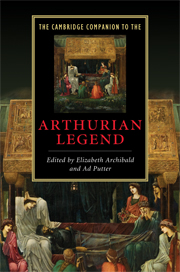Book contents
- Frontmatter
- Introduction
- Part I Evolution
- 1 The early Arthur: history and myth
- 2 The twelfth-century Arthur
- 3 The thirteenth-century Arthur
- 4 The fourteenth-century Arthur
- 5 The fifteenth-century Arthur
- 6 The Arthur of the sixteenth to nineteenth centuries
- 7 The Arthur of the twentieth and twenty-first centuries
- Part II Themes
- Further Reading
- Index
4 - The fourteenth-century Arthur
from Part I - Evolution
Published online by Cambridge University Press: 28 March 2010
- Frontmatter
- Introduction
- Part I Evolution
- 1 The early Arthur: history and myth
- 2 The twelfth-century Arthur
- 3 The thirteenth-century Arthur
- 4 The fourteenth-century Arthur
- 5 The fifteenth-century Arthur
- 6 The Arthur of the sixteenth to nineteenth centuries
- 7 The Arthur of the twentieth and twenty-first centuries
- Part II Themes
- Further Reading
- Index
Summary
Throughout Europe in the fourteenth century King Arthur was known as a great historical figure, ranked as one of the three heroes of Christendom with Charlemagne and Godfrey of Bouillon among the Nine Worthies. The peoples of England and Wales naturally had a particular interest in him - the Welsh as an ancestral Celtic hero, the English as a great predecessor of their own kings. Both Edward I and Edward III cited Arthur's conquests, as faithfully recorded by Geoffrey of Monmouth, in support of their claims to overlordship of Scotland; and both of them liked to represent themselves as latterday Arthurs, notably when in 1344 Edward III proposed to set up his own Round Table. Arthur still belonged, in fact, to the real world of history and modern politics, and it seems that most readers would have learned about him, not from romances, but from chronicles, especially Geoffrey's Latin Historia Regum Britanniae (History of the Kings of Britain) and its vernacular derivatives, chief among them the Roman de Brut of the Anglo-Norman poet Wace. / History / Wace's poem provided a main source for the most widely circulated of all narratives about Arthur current in fourteenth-century England. The chronicle of British and English history known as the Prose Brut was first compiled in Anglo-Norman in the last years of the thirteenth century and later rendered into Latin and English. It survives in at least 240 manuscripts, 181 of them in English.
- Type
- Chapter
- Information
- The Cambridge Companion to the Arthurian Legend , pp. 69 - 83Publisher: Cambridge University PressPrint publication year: 2009
- 1
- Cited by



